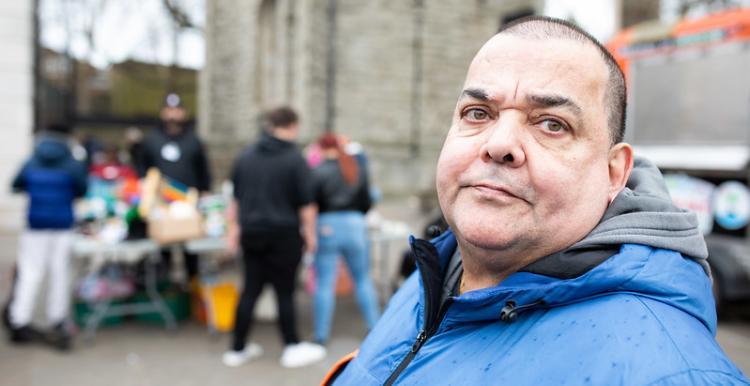What's it like getting care when you don't have much money?

While the NHS is free at the point of delivery, people’s income and where they live can affect their care experience. Research by the King’s Fund in 2024 found people living in poverty had worse care than those with higher incomes.
Several factors contributed to this, including the cost of technology to access services online, like smartphones and broadband internet, and the costs of travelling to get care, like bus fares and parking expenses.
In this blog, we look at seven areas that affect those on low incomes:
- The impact of where you live on access to primary care
- Having to use A&E to get healthcare
- Difficulties with affording travel to healthcare
- The cost of digital healthcare
- Services not being available through the NHS
- The complexity and lack of awareness of the NHS Low Income Scheme
- Difficulties with GPs and the benefit system
We also share our recommendations for making care more accessible for people on low incomes.
How does where you live affect access to primary care?
Living in a deprived area may worsen people’s access to services, particularly GP services. Research by the Royal College of GPs in 2024 found GPs in deprived areas of England had, on average, over 300 more patients per GP than in more affluent areas.
Our 2024 GP Patient Survey analysis found people among the most deprived 20% of the population were less likely to say it was easy to contact their GP practice by phone than the least deprived 20% (47% compared to 51%).
The poorest 20% of those surveyed also told us their last GP appointment was more likely to be remote than the 20% who are most financially well-off (34% compared to 28%).
Healthwatch Dorset’s research into the experiences of people living in Boscombe, one of the most deprived areas of South West England, found that long phone waits and a lack of available appointments made it hard for people to see their GP. If they got an appointment, it was often a phone appointment rather than face-to-face.
Research by Healthwatch Bristol, Healthwatch North Somerset, and Healthwatch South Gloucestershire found that people gave up on making appointments if they couldn’t reach their GP by phone.
We heard that when appointments were available, they could be at inconvenient times for people on low incomes.
People with children might need to pay additional childcare costs to attend their appointments. Appointments might also take place when the person should be at work, forcing them to choose between going to their appointment or potentially losing vital income. Research undertaken for Children North East backs this up.
Meanwhile, research by Healthwatch Sunderland found that working people in deprived areas found it difficult to book early appointments, and wanted evening and weekend appointments when they would be available to attend.
People on low incomes told Healthwatch Blackburn with Darwen that lack of trust in the care provided could also put them off contacting their GP. They felt ignored and not listened to and that surgeries’ triage processes were intrusive and inappropriate.
Are people having to use A&E to get healthcare?
Because of the barriers to accessing GP services, people living in deprived areas are more likely to seek help from urgent and emergency care departments. In the year 2023/24, attendance rates at A&E departments in England for the 10% of the population living in the most deprived areas were about twice the attendance rates for the least deprived 10% (3.3 million compared to 1.7 million).
Healthwatch Blackpool found that people living in deprived wards consciously avoided going to the GP and attended urgent care instead, despite knowing this is not the “right thing to do”:
“I would deal with something myself for a long time then go to the walk-in if needed as you’re more likely to get seen rather than GP.”
Story shared with Healthwatch Blackpool
Can people afford to travel to healthcare?
Travelling to tests, treatments, and appointments can be very expensive for those with low incomes. People talked about struggling to afford the cost of travelling to hospital, particularly people from rural areas, and when appointments were scheduled early in the morning or late in the day.
“A school contacted us and said that a parent of a young child was having difficulty getting transport for their child’s hospital appointment in Nottingham for a biopsy. They do not have a car or anyone to take them. The child has to be there at 7.30 AM. They have been waiting a year for this appointment. They have researched public transport, and trains do not run early enough to make this appointment. The parent is on a low income. They cannot afford a taxi, and the local Community Car service in Boston would cost £75-80, which is too expensive.”
Story shared by Healthwatch Lincolnshire
Healthwatch Wakefield’s report on access to urgent care found people on low incomes were more likely to say that ease of getting to the service by public transport was an important factor in deciding which urgent care service to visit.
People ineligible for patient transport services struggled to afford to travel to hospitals, particularly when they were not local. Healthwatch East Riding of Yorkshire found that people living in Bridlington found it difficult to access healthcare appointments in other areas, and weren’t eligible for help with travel costs or non-emergency patient transport.
Healthwatch Rotherham found that public transport to hospitals was not reliable or frequent enough. This meant people living in poverty were less likely to attend hospital appointments.
People on low incomes are more likely to attend hospital appointments when they get help with transport. Healthwatch Birmingham found that providing help with travel costs to the local Children’s Hospital led to fewer missed appointments.
What are the costs of digital healthcare?
Taking advantage of digital healthcare is harder for people on low incomes at a time when the NHS is shifting to become a digital-first service. People talked about not being able to afford smartphones, broadband contracts, or mobile phone data to use digital healthcare options. As a result, they couldn't access some services:
"Hospitals increasingly require patients to confirm appointments via smartphone-specific features (e.g., MMS or data-enabled replies), which excludes those with basic phones, risking cancelled appointments or delays in care."
Story shared with Healthwatch Hackney
What happens when people can’t access services through the NHS?
We heard about people who had problems affording care that the NHS doesn’t pay for or that they can’t access. People on low incomes said they couldn’t afford to pay for private dentistry if they couldn’t find an NHS dentist. This meant they faced higher instances of poor dental health. For example, Healthwatch Leeds highlighted that children from families in financial difficulty struggled to look after their teeth due to the cost of dental care.
We also heard about the cost of earwax removal treatment, which most GP surgeries no longer provide. Healthwatch East Sussex highlighted that people on low incomes struggled to afford the cost of private treatment. As a result, they experienced a range of symptoms, including hearing loss.
Do people know about and understand the NHS low-income scheme?
Support is available to help meet some costs, but complex eligibility criteria mean getting support is difficult. We heard about:
- People being ineligible for help because their income is over the universal credit income threshold level.
- People losing entitlement because they earned extra income the month before, because universal credit entitlement is reassessed every month based on their income from the previous month.
- People being unaware of income threshold levels and charged for inadvertently claiming help when they were not entitled.
- People who are eligible for support with NHS dentistry costs not being able to get it if there are no NHS dentists available locally.
“They wanted to remove several teeth and fit dentures … suddenly, universal credit reported I’d earned a few £ over the threshold and now I can’t have treatment unless I pay hundreds. I can’t afford it and now I have loose teeth causing pain and I can’t eat.”
Story shared with Healthwatch England
What difficulties do people have with GPs and the benefit system?
People who claim contribution-based employment and support allowance or universal credit because they are sick need to supply a GP fit note.
People talked about the difficulty of getting regular fit notes to support their benefit claims. We heard about GPs who insist on people booking appointments to assess their condition and issue a fit note, but it wasn’t easy to book a timely appointment before their last fit note ran out. People were worried about losing money due to possible breaks in their benefit claims.
“I needed to renew my long-term fit note. I was told by the GP that I needed to have an appointment before this could be updated. This seemed fair enough, but the appointment was so far away from the fit note running out that it would have affected my benefits. So I had to spend a stressful time begging to at least have the fit note extended until I get the appointment to appease the DWP. Could it be common practice to at least renew fit notes in the short term until the review can take place to prevent this high level of stress?”
Story shared with Healthwatch Lincolnshire
What would make care more accessible for people on low incomes?
Make travel for healthcare affordable
- The NHS should cover the costs of transport and accommodation when patients are offered faster care further from home.
- NHS England should also ensure people know about patient transport services and travel reimbursement schemes, and review the promotion and delivery of these.
- Expand the NHS Healthcare Travel Costs Scheme to cover trips to primary care, as well as hospital appointments. This would take into account the movement of services from hospitals into communities.
- NHS England must reopen its review of the Healthcare Travel Cost Scheme to speed up reimbursement for those eligible.
- Councils should work with local health providers when making decisions on public transport to help people access remote health providers.
- NHS England should support NHS trusts in considering further reduction of parking charges.
Help people with cost of medications
- GPs should be able to offer over-the-counter medications on prescription for people who can’t afford them, based on socio-economic need.
- The NHS should raise awareness of Prescription Prepayment Certificates and local NHS Minor Ailments Schemes through national campaigns and the wider rollout of NHS posters.
Reform NHS dental care to improve access
- The NHS dental contract should be reformed to ensure people who can’t afford private care can still access NHS dental services. Dentists should also follow NICE guidance to offer check-ups based on risk, freeing up appointments for those most in need.
Improve access to health-related benefits
- The Government and NHS England should commission a national helpline to help people understand and access health and care-related benefits, including Statutory Sick Pay, Universal Credit, and the Healthcare Travel Costs Scheme.
Extend statutory sick pay for long NHS waits
- Extend statutory sick leave beyond the current time limit of 28 weeks to support people who can’t work because they have been waiting for care on NHS elective waiting lists.
More support for unpaid carers
-
Reform Carer’s Allowance by:
- Increasing the total benefit provided
- Giving people access to more funding when looking after multiple people
- Allowing more than one carer to claim for the same person
- Moving from an earnings limit to an hours of work limit
- Scrapping the 21-hour rule for those in full-time education

